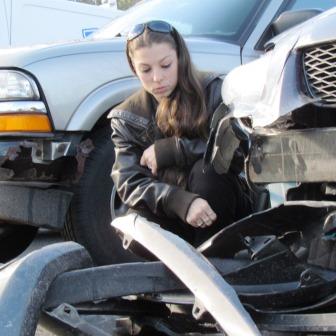
Motor vehicle accidents don’t “just happen”, contrary to the old saying. For the most part, motor vehicle accidents happen because someone is at fault. If everyone behind the wheel always drove safely and followed the rules, there would be few if any accidents on the highways.
Even good drivers make mistakes. Bad ones make more of them.
All it takes is a moment of distraction for the path of a car to enter a danger zone. When a crash happens investigators look back to find out what went wrong and who is at fault. More serious injuries call for a more intense look back. Investigators track the paths of the vehicles and the actions of the drivers up to the point of impact frame by frame like a move
Driver inattention, driver distraction, drunk driving and other neglect often lead to serious car accidents. This is common sense. Public awareness campaigns on such issues fill the airwaves and other media. Regardless, bad driving habits continue to cause car accidents and injuries on the highways.
5 Common Causes of Motor Vehicle Accidents
Some of the many things drivers do that cause accidents:
- Allowing seemingly minor distractions to divert driver focus. Distractions include a phone call, a text, an argument with a passenger. People cause accidents by eating or even fiddling around with the music player. They all mean the driver is not focused solely on the road.
- Failing to look at directions before a trip to a strange location. GPS can give great directions. But drivers failing to review a travel plan easily find themselves lost, looking at directions rather than concentrating on driving safely.
- Not constantly scanning the road ahead, staying alert to what other drivers are doing and traffic conditions. Watching vehicles ahead reduces the likelihood of sudden stops, lane changes and accidents.
- Becoming angry, agitated and tense by other drivers. A calm driver handles rapid changes in driving conditions better than an angry driver and is better able to deal with those challenges.
- Ignoring bad conditions. Multiple car pileups occur more and more in bad weather as drivers refuse to increase following distance and reduce speeds. Even on local roads crash ‘em bash ‘em rear end accidents flourish in snow & ice conditions.
Why is it Important to Find Fault?
After an accident if the other driver claims “it was just an accident” or “let’s take care of this without the police”, think again.
Who pays for your injuries and damages after a car accident depends on whose negligence caused the collision. In legal terms, negligence means a failure to follow the basic common law duty imposed on all drivers to drive safely, with due regard for everyone else on the road.
For example, rules of the road require drivers to obey posted traffic signals and avoid driving while distracted or drunk. A driver causing a motor vehicle accident because he or she drove while texting is negligent and will be held liable for injuries and damages of those hurt by the resulting collision. But car accident cases aren’t always so simple.
Finding Fault in Motor Vehicle Accidents in Disputed Circumstances
Most often people who never saw the accident or were anywhere near the scene are the ones who have figure out how it happened and who was at fault. These people include insurance company claims adjusters, police officers, and if it goes far enough, judges. How do they determine fault?
In Massachusetts, for example “Standards of Fault” exist to guide those who must make such a decision. The standards are applied to the facts of an accident to determine if a driver is more than 50 per cent at fault. Drivers found at fault after an accident will likely face higher insurance rates. Their insurance company also faces liability for anyone injured by the at fault driver. The standards, available here, include issues such as failure to proceed with due caution from a traffic control or sign and rotary accidents.
Many states, like New Hampshire, have actual formal “Rules of the Road.” The rules are spelled out in detailed state statutes. They cover obvious issues which aren’t necessarily always followed such as how to behave when passing other cars. They also say what to do when approaching an intersection, and who has the right of way in specific situations. The New Hampshire statute is RSA 265 which currently includes 161 subsections.
What to do After Motor Vehicle Accidents
No matter how safely you drive, others don’t always follow the rules. There’s no promise that accidents won’t happen or that you won’t be injured due to an accident caused by the fault of another. If you are injured in a car accident that is the fault of someone else, a personal injury attorney can work on your behalf to obtain compensation from the insurance company of the driver at fault.
What to do after a car accident in Massachusetts.
What to do after a car accident in New Hampshire.
My office, with a free initial consultation, will seek maximum possible compensation for your motor vehicle accident. We represent accident victims in Massachusetts or New Hampshire. Fighting insurance companies often takes time. Without having handled a personal injury claim before, insurance companies may take advantage. My office will handle the details and see your case through to the best end possible.
Model: Rebecca Langelier
Views: 8




